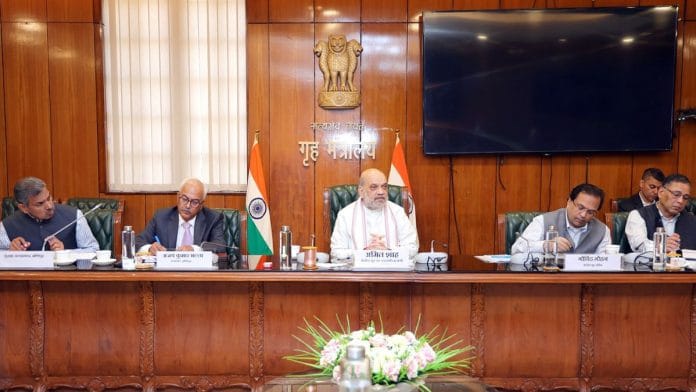New Delhi: Home Minister Amit Shah on Saturday issued directions for the free movement of people on Manipur’s roads starting 8 March, after chairing a high-level review meeting on the security situation in the ethnic strife-hit state.
According to a statement issued by the home ministry, he also directed that strict action be taken against anyone attempting to obstruct their movement.
Other key takeaways from the meeting included the expedited completion of fencing along Manipur’s international border and an intensified crackdown on the drug trade.
Even since ethnic violence first erupted in the northeastern state in May 2023, Manipur has remained deeply divided, with Kukis concentrated in the hills and Meiteis in the valley. The valley, where the airport, key hospitals, schools, and colleges are located, has been entirely inaccessible to the Kukis and the Meiteis have not been able to travel to the hills. Ethnic violence has so far claimed at least 250 lives, and displaced over 50,000 people.
Manipur has been under President’s Rule since 9 February, following the resignation of its chief minister N. Biren Singh. It was a threat from a section of BJP MLAs opposed to Biren that pushed the party’s central leadership to demand his resignation, though the caretaker CM insisted in an interview with ThePrint that there are no camps within the Manipur BJP.
“The home minister directed that the fencing work on both sides of the designated entry points along Manipur’s international border should be completed at the earliest,” the Ministry of Home Affairs (MHA) statement further said. “He said that to make Manipur drug-free, the entire network involved in the drug trade should be dismantled.”
The meeting was attended by Manipur Governor Ajay Kumar Bhalla, the Union home secretary, the Intelligence Bureau director, deputy chief of Army Staff, head of the Army’s Eastern Command, directors general of Border Security Force (BSF), Central Reserve Police Force (CRPF) and Assam Rifles, Manipur’s security adviser, and senior officers of the MHA and Manipur administration.
Fencing the border
Sources in the security establishment told ThePrint that people are being warned that strict action will be taken against those who gather in groups to obstruct the movement of others, including security personnel making arrests, an issue that has become increasingly common in the state.
“Although security forces have been deployed and unauthorised checkpoints set up by locals—once a common occurrence—are no longer allowed, strict instructions have been issued to the public on both sides (hills and valley) to refrain from obstructing movement. Failure to comply will result in strict action,” a source said.
“This measure is intended to ensure that Kukis can safely travel to the valley, access the airport, and reach other essential areas, while Meiteis can move freely to the hills. If people do not comply, strict action will be taken,” the source added.
According to sources in the central government, work on fencing over 300 km of the expansive India-Myanmar border that falls in Manipur, is on. The border between India and Myanmar is porous and runs for 1,643 km through the four states of Nagaland, Manipur, Arunachal Pradesh and Mizoram. Barring a few kilometres, it is entirely unfenced.
“The home minister has said that fencing work on both sides of the designated entry points along Manipur’s international border should be completed at the earliest. The work will begin on a war footing,” the source said.
The Centre has also called for suspension of the free movement regime (FMR) along the India-Myanmar border to “stop the influx of illegal migrants”.
The FMR allows tribes living along the border on either side to travel up to 16 kilometres inside the neighbouring country without a visa.
Amid ethnic clashes in Manipur, the FMR has become a point of contention as local residents complain it is often misused and facilitates “illegal immigration, drug and arms trafficking”.
A mass arms surrender
The source quoted above also said that in the past few days, many people have come forward to surrender arms.
This comes after Governor Bhalla’s call to the public to voluntarily surrender looted and illegally held weapons and ammunition in seven days. The deadline, which he had set a week after President’s Rule was imposed, has been extended by another seven days.
On Thursday, which was the last day of the initial deadline, radical armed group Arambai Tenggol surrendered 246 weapons in Imphal West.
“It was a mass surrender of weapons by the group. We are now waiting for others as well to do the same. After the deadline ends, the raids to recover the looted weapons will begin,” the security establishment source said.
Over 5,682 weapons, including more than 200 AK-47s, 406 carbines, 551 INSAS rifles, and 250 machine guns, besides over 6.5 lakh rounds of ammunition, have been looted from police armouries and stations over the last two years, primarily in the Meitei-dominated Imphal valley. There have been no substantial recoveries, leaving a significant cache in the hands of local residents, which has exacerbated the cycle of violence from May 2023.
(Edited by Gitanjali Das)
Also Read: Manipur BJP MLAs explore option of forming new party if President’s Rule is prolonged






